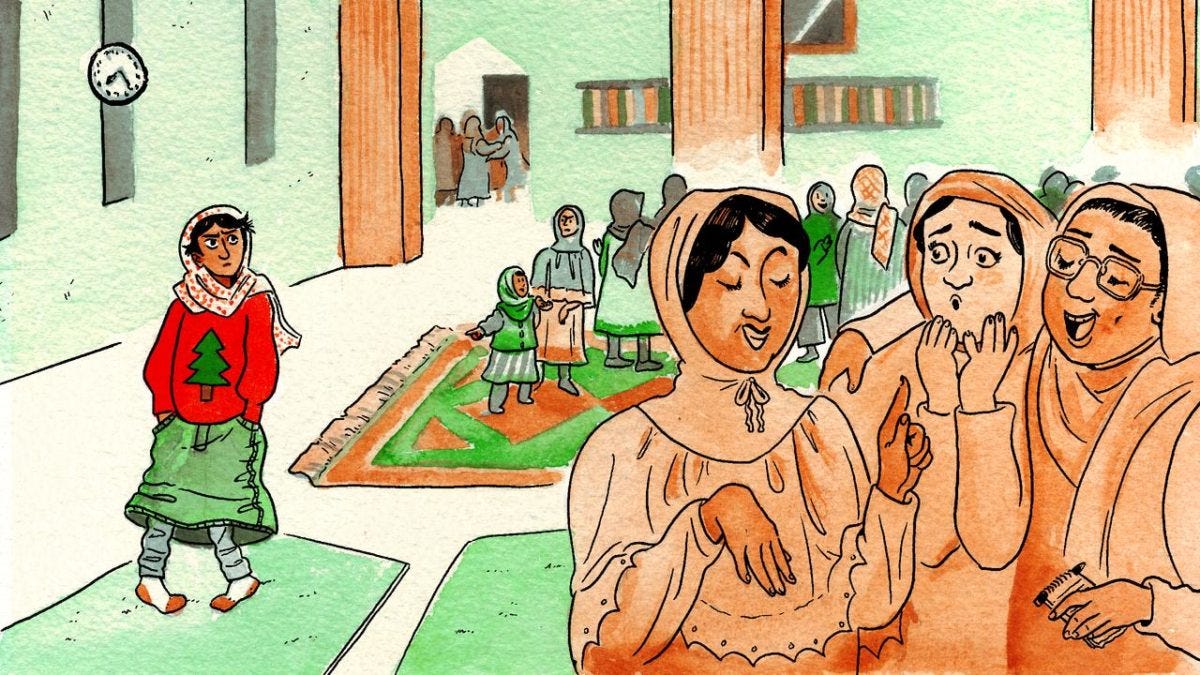Mutilating A Daughter


Illustration by Laurel Lynn Leake
About a month ago, This American Life ran a story that gave me the biggest lump in my throat and painful knots in my stomach. It was the story of a young woman who discovered she was the victim of female genital mutilation.
Mariya Karimjee’s Story
If you’re not familiar, This American Life is a wildly popular radio show and podcast produced by Chicago Public Media. The series features journalistic narratives set around a weekly theme.
This episode focuses around Mariya Karimjee, a Pakistani immigrant who moved to the United States years after she had part of her genitalia “cut” as a custom of the Dawoodi Bohra Muslim community. She begins her narrative in Karachi, Pakistan describing a conversation with her mother and pediatrician as they discuss getting her “bug” removed. And with their pediatrician’s approval, the seven-year old Mariya was laid upon a tarp on their living room floor as a neighbor woman painfully removed her “bug.”
She discovered what had actually happened after she overheard two women talking about their “bug” operation at a Houston, Texas area Mosque. A google search revealed that she had likely been given a clitoridectomy. According to Mariya, the custom is specific to their sect and region – and not a common practice in Islam. Yet it is their cultural and religious affiliation that demands their continued allegiance to the practice. “The clergy demands it,” Mariya explains.
Never A Good Feeling
The reality of what had happened isn’t completely clear to her (or the listener) until she details her first sexual experience. To preface her own experience, she shares what advice her mother had passed along on sexual relationships: “Sex was almost never a good feeling.” Her mom was right. For Mariya, it was unbearably painful.

She goes on to describe the work she is doing to end the practice in her community and the great deal of support she receives from within her own family. Her relationship with her mother is consoled when she learns that her mother had tried to stop it and she is given a new sense of optimism as she commiserates over the practice, albeit briefly, with her grandmother.
(The audio for the story can be found here, a transcript here.)
Raising A Nun
Sometimes, as I hold my own daughter, I jokingly comment about her becoming a nun or never getting married and staying “daddy’s little girl” forever. I imagine this type of teasing is common among fathers of girls. As I ponder about the mutilation that happens to these Bohra girls, I am faced with the future reality of my children as sexual beings. Mariya’s “bug story” that led up to her clitoridectomy is an extreme example, but it created a significant challenge when she learned it was a lie. She tried rejecting her faith, her culture, her family because of this painful deception.
Her culture’s barbaric practice claims some sort of sexual morality as a justification. Perhaps partially out of fear or shame over the taboo subject of sex. I am challenged with how I am to develop an honest and helpful relationship with my children on these “uncomfortable” subjects. Failing to address them properly can have real consequences. Beyond being a painful experience, “ruining” sex for Mariya meant destroying an opportunity for emotional intimacy. She expresses her own anxiety about intimacy with anger and resentment toward her family and faith.
For Christian Parents
Christian parents are not immune from a similar fears especially in the era of sexually-charged liberalism.
My children will face a world that has a drastically different understanding of what human flourishing means. Will my children look at how they were raised and be filled with anxiety and resentment toward their Christian upbringing? Will the culture of sex, feminism, and doubt overcome my children’s upbringing in traditional values? In passing on the faith have I given them a full-orbed understanding of Christ and His Church or one that catered to my weaknesses, shortcomings, and fears?
Overcoming the world and its mutilations requires a new whole. This wholeness or unity is how St. Paul describes our health as Christians (and even sexual identity.) “Submit yourselves one to another in the fear of God.” (Ephesians 5:21) Newness requires a healthy family, an orthodox church, a caring community, and so on, as none of us can exist on our own. Wholeness requires the death of old broken anxieties, and the constant rebirth of our dependence on Christ.
I’m sure the “bug story” was born out of some sort of misguided affection, as Mariya explains, it has no origin in the history or doctrine of their religion. It was an extra that someone had tacked on. For newness to be born in our children we do not need a new story, a new practice, a new standard, but rather the whole story with the whole Gospel.
The post Mutilating A Daughter appeared first on Kuyperian Commentary.

